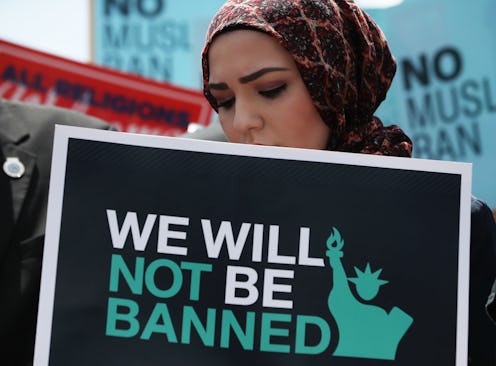News
Trump’s Travel Ban Had A Real Impact On Visa Applications Last Year

Every year, millions of people around the world apply for visas to visit the United States. And while it's standard for a chunk of those applications to be rejected for various reasons, the number of visa applications denied in 2018 due to the Trump administration's travel ban increased by tens of thousands from the previous year, according to State Department data released on Tuesday.
Due to Executive Order 13769, which the Supreme Court upheld last June, people in Iran, Libya, Somalia, Syria and Yemen, Venezuela, and North Korea are barred from entering the United States. In most cases that means they aren't able to obtain visas to immigrate to, travel around, or work in the U.S. According to the State Department report, it issued more than 37,000 visa application denials due to the travel ban in 2018. In 2017, when the ban was only partially in effect, Reuters reported that there were less than 1,000 travel ban-related rejections.
In 2018, as the report notes, the State Department denied 15,384 foreigners from obtaining visas, citing the "2017 Executive Order on Immigration," otherwise known as the travel ban. Another 21,645 nonimmigrants were rejected for the same reason (non-immigrants are people who aren't citizens, but have established temporary residency in the U.S., like students). The report also states some 2,200 applicants "overcame" their visa denials — meaning, the applicant successfully appealed the decision — but it's unclear how many of those were actually 2018 applicants, and how many were from previous years.
The Muslim-majority countries affected by the ban were hit hard, according to Reuters. Comparing the State Department's 2017 data with 2018, the number of visas issued to people in Iran, Libya, Somalia, Syria and Yemen dropped 80 percent from 72,000 visas in the 2017 fiscal year to 14,600 in the 2018 fiscal year.
A waiver process to appeal a denied visa does exist, but immigration rights activists helping families split by the travel ban have said it's largely ineffective. "The waiver process is a sham," Brittney Rezaei an immigrants' rights attorney at the Council on American-Islamic Relations (CAIR) told Bustle in June, explaining that the State Department and individual consulates provide little information about how to apply for a waiver, which holds people in limbo.
The Immigrant Advocacy & Litigation Center currently has a lawsuit in process that alleges the government has provided no guidance around "waiver application procedures, how waiver eligibility determinations are made, or whether any recourse exists for persons who are not considered for a waiver." Representatives for the government have argued that decisions made by consular officials technically cannot be appealed, nor do applicants have the right to individually litigate their cases.
According to The Washington Post, visa issuance rates for people trying to move permanently to the U.S. from around the world have been dropping ever since Trump took office. It's unclear whether that's a direct effect of the executive order; even though it was issued shortly after Trump's inauguration, it only came into partial effect in June 2017 before being revised and upheld a year later. Another explanation is that fewer people are applying to move to America.